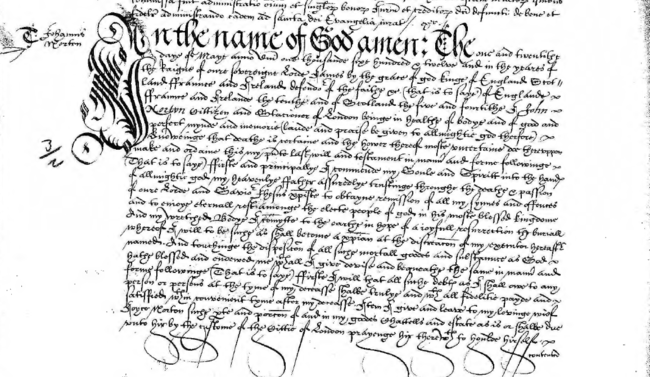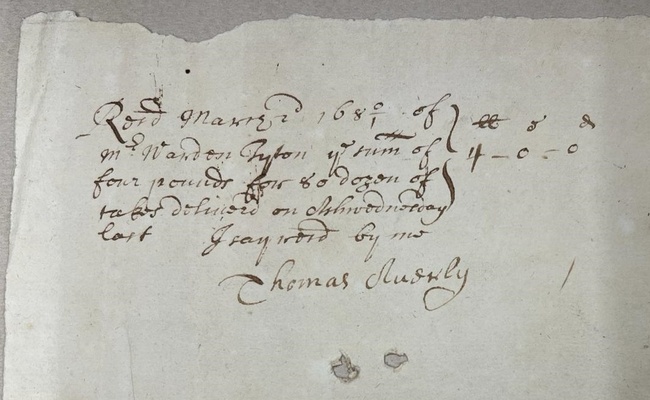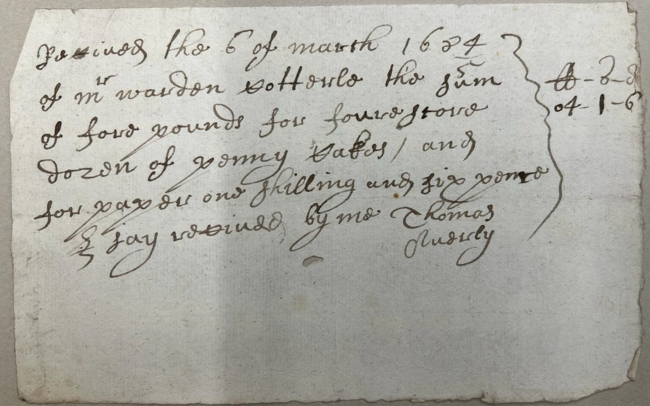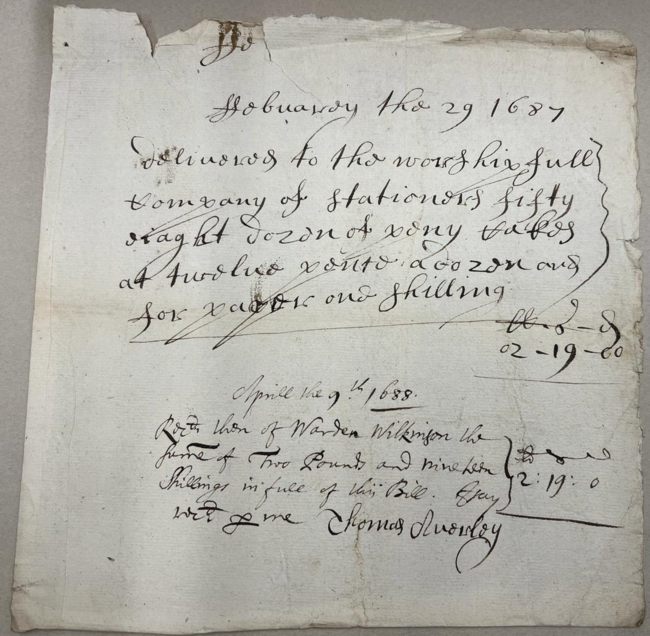A HISTORY OF CAKES AND ALE
9 FEBRUARY 2024
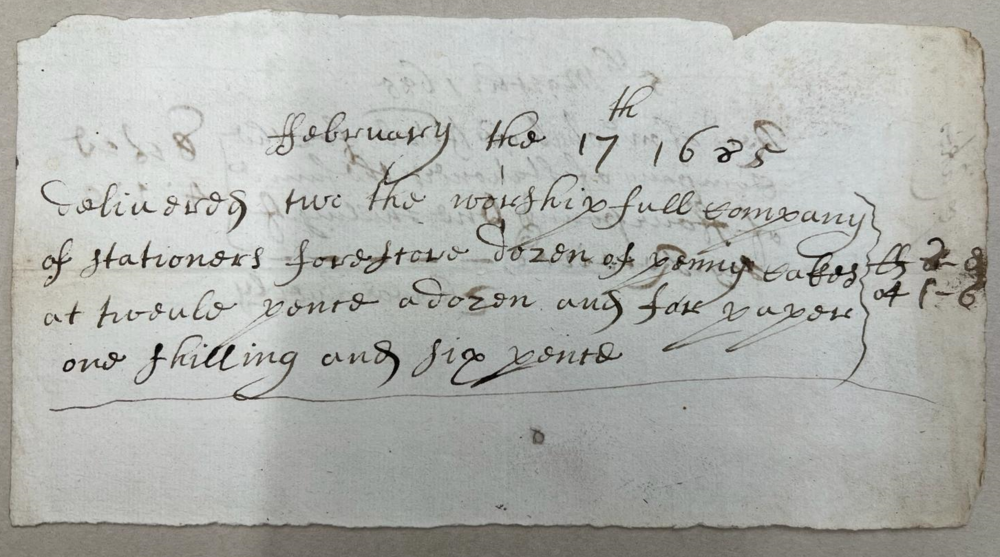
February 13th is Shrove Tuesday - which for Stationers means celebrating the centuries' old tradition of Cakes and Ale, established by bookseller John Norton in 1613. Here archive intern Beth Debold explores the history of this tradition.
Main image: Delivery note for baker Thomas Averley's 'penny cakes' in preparation for Cakes and Ale, 1685. Stationers' Company Archive, TSC/D/11/05
The serving of cakes and ale around Ash Wednesday is a long tradition in the Stationer’s Company. This custom has its origins in a generous gift made by John Norton, a prominent member of the Company who died in 1613. Norton served on the Court of Assistants and as Master, and lent his name to such weighty publications as John Gerard’s beautifully-illustrated herbal and Abraham Ortelius’s Theatrum Orbis Terrarum.
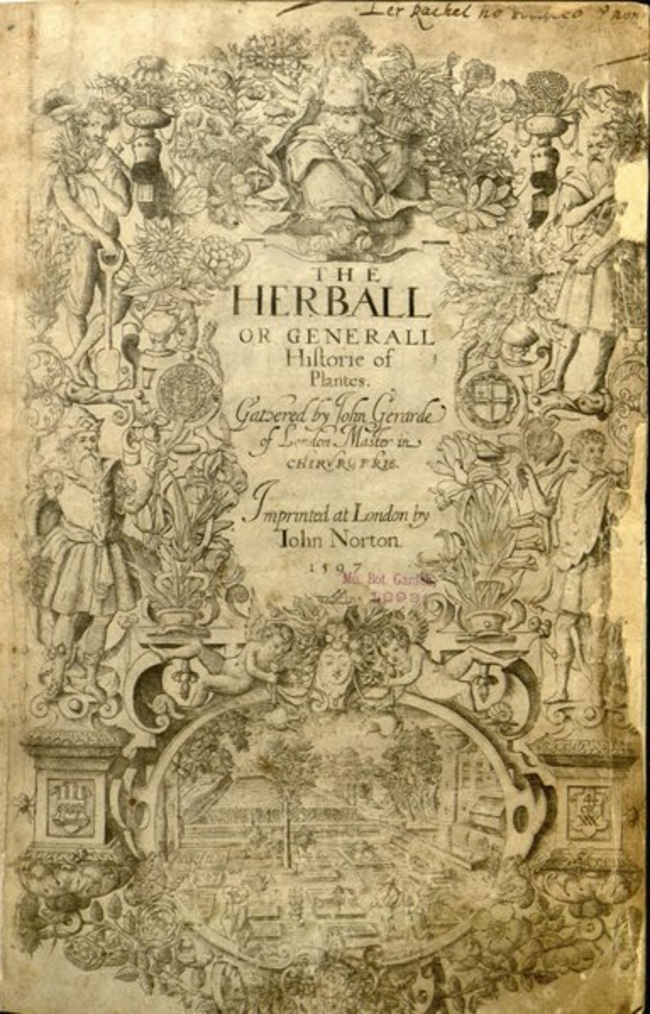
Title page of Norton's 1597 edition of Gerard's Herball, taken from https://www.biodiversitylibrary.org. Public domain, via Wikimedia Commons
After his death, his will outlined several generous financial gifts to the Company and other local institutions, including the parish church of St. Faith’s, which at that time was located in the underbelly of St. Paul’s Cathedral. These gifts set up the Stationers for success, helping to purchase land and buildings which later formed the basis for the endowment of the Stationer’s School, and that made possible grants to support Stationers in need of the Company’s charity.
In describing his gift in his will, Norton was quite specific (as were many early modern will-makers) about how this money was to be used. In addition to detailed instructions for how his gift was to be divided and used to purchase lands that would generate rental income for charitable redistribution, he also thought of the future social and community life of his Company. His will, a copy of which is preserved in the National Archives, states: “my will is that one Sermon be preached in St. Faith’s Church aforesaid upon Ash Wednesday yearly forever for the which the Preacher [is] to have ten shillings, and the residue of money…shall be bestowed upon the Company of Stationers of London at Stationer’s Hall in cakes, wine, and ale after or before the sermon upon Ash Wednesday.” It is moving to think of John Norton imagining the life of the Company going forward in his absence; gathering together to eat, drink, and find community in shared religious tradition.
Extract from Norton's will, with select transcript
The Company took John Norton’s gift seriously, and began a now centuries-long tradition of dispersing cakes and ale to the membership. The tradition was seldom mentioned in the formal records, although in the 1620s and 30s several members were fined for failing to come and pay proper respects to Norton’s generosity. Where we find stronger evidence of the tradition’s ongoing importance is in the Company’s financial records. Although receipts for petty cash, routine maintenance, and other humdrum affairs necessary to the running of the Company don’t survive for the earlier part of the century, we do have such records beginning in the 1670s and 80s. In these files, alongside bills for dinners out at local taverns and receipts for such necessary tasks as cleaning the hall, oiling locks, and mending livery gowns, we find receipts for cakes delivered to the Hall for Ash Wednesday.
Thomas Averley's receipts from 1681, 1684 and 1687. Stationers' Company Archive, TSC/D/11/05
These examples of such receipts show that the Company was consistent, at least during the 1680s, in where they purchased their cakes pursuant to Mr. Norton’s bequest. All such bills for this decade, and into the 1690s, are signed by one Thomas Averley, who furnished nearly one thousand “penny cakes” each year. Although he was of course likely a baker, grocer, or other purveyor of comestibles, we don’t know anything else about Averley, beyond the Company’s loyalty to him for their Ash Wednesday tradition. I like to think of Averley as a neighbour of the Company; familiar with the various comings and goings of printers, booksellers, and their families around the Hall; walking by it during his daily errands; and each year baking hundreds of small cakes for this special event.
If you are able to join the Company at this year’s event, please raise a toast to John Norton, who imagined this moment, and to Thomas Averley, who for a time laboured to make it possible.
Beth DeBold is a postgraduate researcher in early modern British social history and culture, currently completing an internship placement at the Stationers' Company Archive as part of a Collaborative Doctoral Award project shared between Newcastle University and the Stationers' Company. After a first career in libraries, including curatorial work at the Folger Shakespeare Library, Beth now focuses on the human labour of the book and print trades during the seventeenth and eighteenth centuries. Her doctoral project examines the lives and social networks of Stationers' apprentices who came to London to learn how to make their living at the press or in the bookshop.
